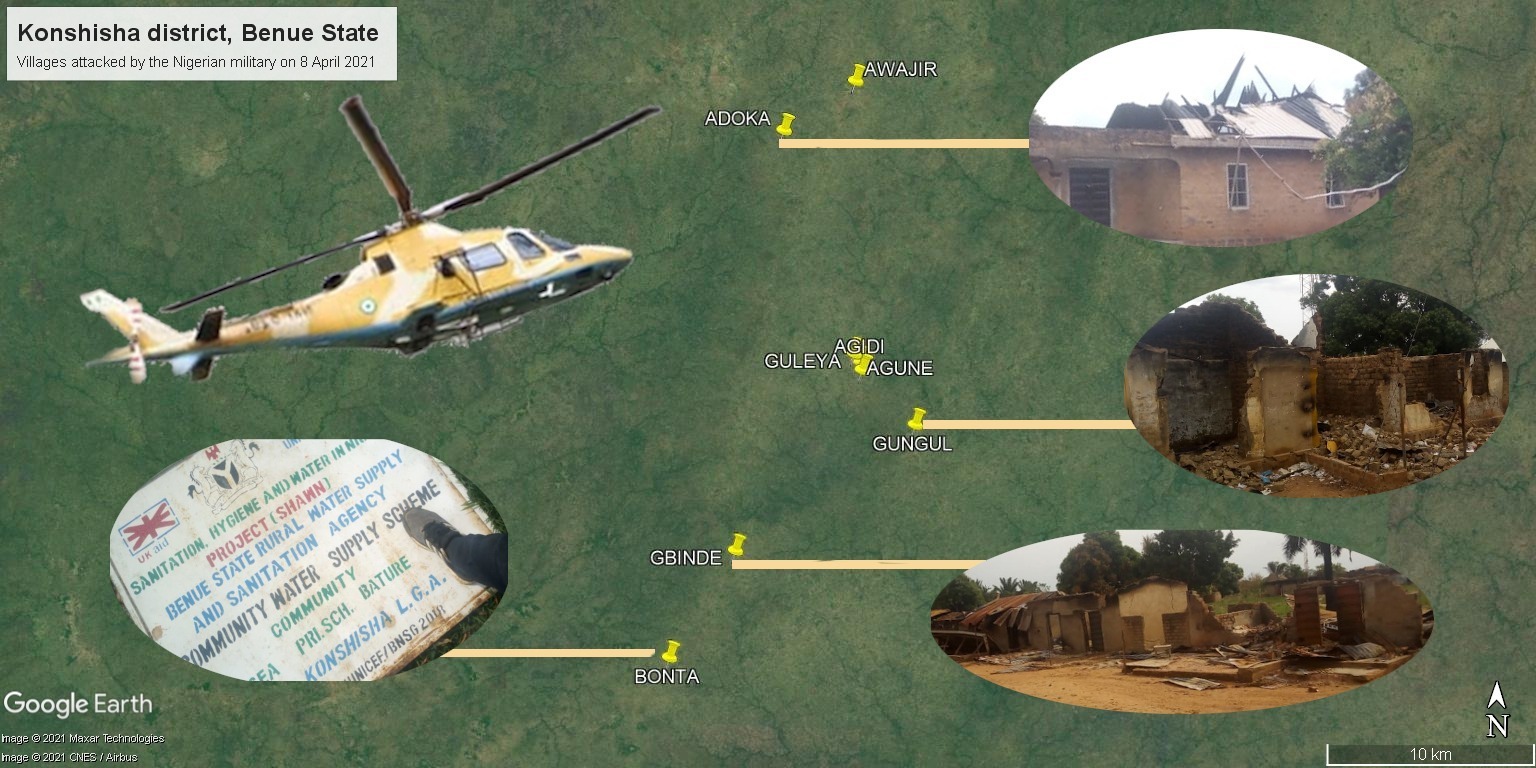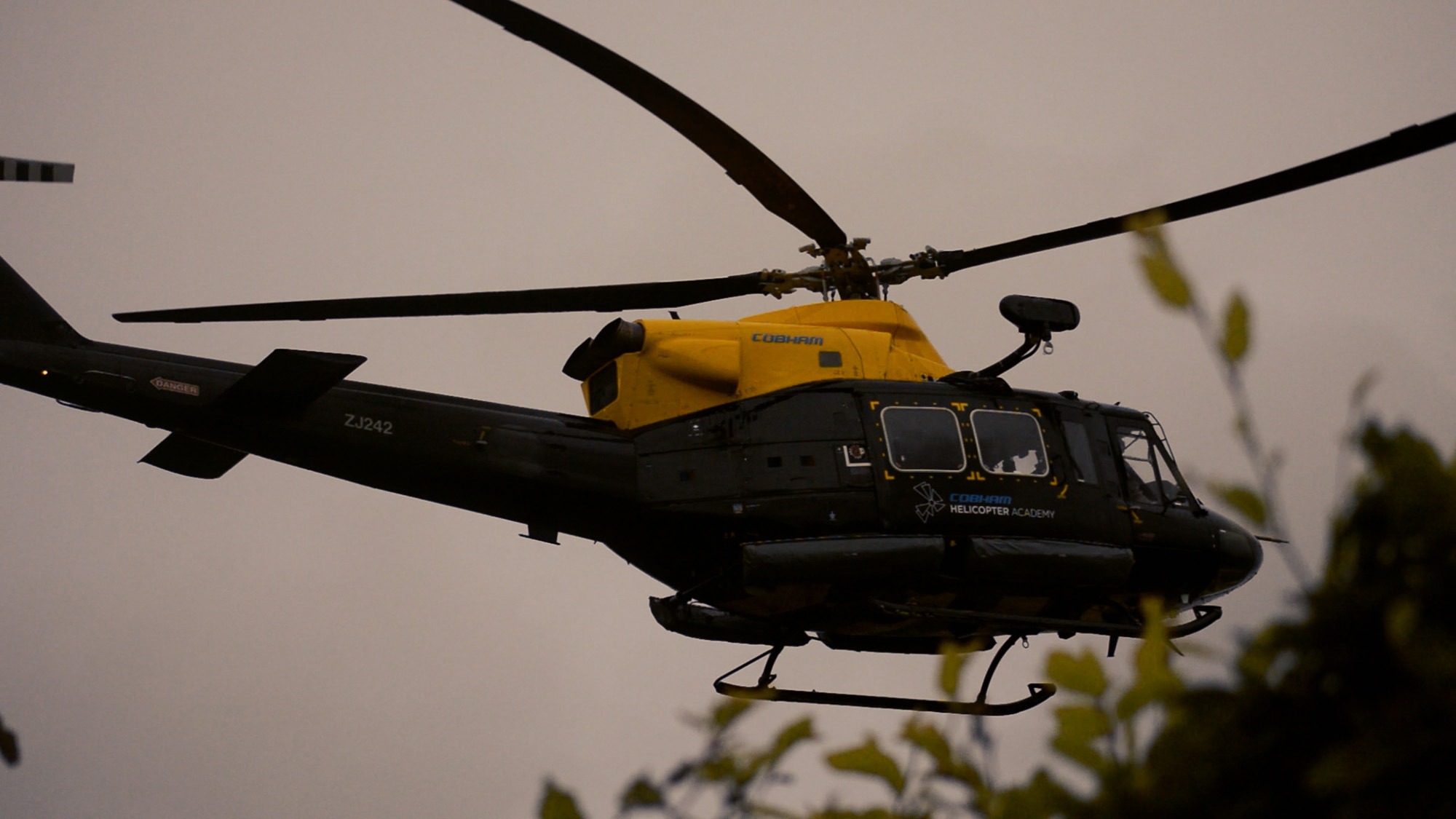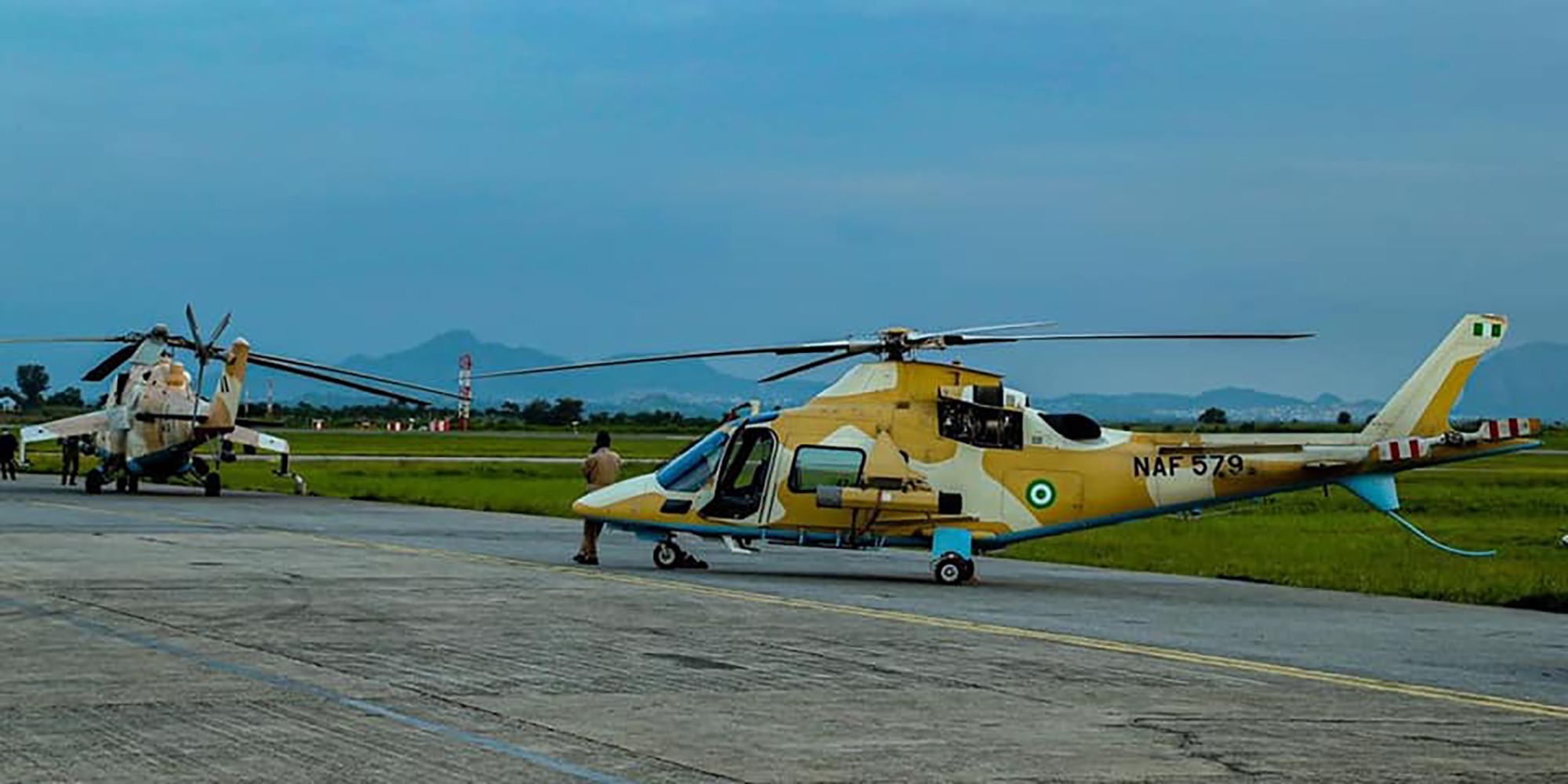- Amnesty International calls for “a major overhaul of the way that military training is regulated” by the UK
- Nigerian lawyers condemn the airstrikes as a “reckless use of force by the military”
- Eyewitnesses blame airstrikes on helicopter gunship made by Leonardo, an Italian firm that is supplying Nigeria with combat aircraft in a billion euro deal
- Leonardo has close links to the UK government and made the model of the helicopter Prince Harry flew in Afghanistan
- Attacks damaged UK aid-funded water supply scheme run by Unicef
Nigeria’s air force has attacked civilian targets including a school six months after Declassified revealed that a private company in England was training military helicopter pilots from Africa’s most populous nation.
Multiple villages in Konshisha district, eastern Nigeria, were destroyed by a military helicopter on 8 April in retaliation for the killing of 11 soldiers by “armed bandits” during a communal dispute over land.
Two eyewitnesses, including a military veteran, have told Declassified that the Nigerian air force used an AW109 helicopter to fire rockets indiscriminately at homes, farms and a school. The attack caused over a thousand people to flee the area.
Nigeria’s military has confirmed that a helicopter and its special forces opened fire in Konshisha after its soldiers were killed, but this is the first time the exact aircraft has been identified.
Records show it was made by Leonardo, an Italian company that has just sold over €1-billion worth of combat aircraft to Nigeria.
A researcher for Declassified visited eight sites in Konshisha a fortnight after the attack when the army was still controlling access to the area.
We found many of the towns and villages across a 30-kilometre distance were deserted with residents still unaccounted for, making it hard to assess the scale of civilian casualties.
Initial reports suggested 70 people were killed. Samuel Ortom, the governor of Benue state, where Konshisha district is located, later dismissed these reports as inaccurate.
He said six civilians were killed, including a handicapped man who “died after his destroyed house collapsed on him, and a middle-aged woman fell while running.”
Nigeria’s military denies killing any civilians but admits to destroying houses that it says bandits had commandeered when local people fled the fighting.
Tyolam Iorapuu, a 45-year-old farmer in Bonta, the southernmost affected settlement, told Declassified that hundreds of people were still unaccounted for. He said the mood in Bonta was “calamitous, filled with anger, anxiety, and uncertainty of what the future holds.”
A Catholic primary school in Bonta lay in ruins, with the roof destroyed and interior charred from flames. A barn containing yam, a food staple, was burnt down and a UKAid-funded water supply scheme was also damaged.
Six kilometres north of Bonta we found a marketplace in Gbinde that had suffered extensive damage to roofs and walls, with some stalls reduced to rubble. Another market in Gungul, 15km northeast of Bonta, showed signs of similar damage to its buildings and machinery.

Gungul-based businessman Fanen Godo, 35, told Declassified that three of his shops had been burnt down, causing a “colossal” £60,000 loss to his livelihood. Godo questioned whether the military’s response to the bandits was proportionate, given that civilian sites were attacked far from the initial confrontation.
Iorlaha Vihimga, a 57-year-old ex-serviceman, told Declassified he was on his farm in Agidi, a village near Gungul, when he saw “a desert camouflage military aircraft with tail number NAF-579 hovering in the skies.”
“Multiple gunshots ringed the air so I had to rush home for safety, where I saw my residence was razed down. As an ex-soldier, I tried to identify myself to the onlooking soldiers but they warned me not to come close to them.”
Nigerian air force social media posts show the same helicopter has previously been deployed as part of Operation Whirl Stroke, the name of the task force which raided Konshisha. Another eyewitness, this time in Gbinde, confirmed Vihimga’s description of the helicopter and alleged that it “threw bombs at us and our buildings.”
The man, who asked to remain anonymous, added that ground troops drove Toyota Hilux 4x4s bearing the insignia of Nigeria’s 72nd special forces battalion, armed with Belgian-made machine guns.
Orga Adoji, a resident of Agidi, told other reporters that his brother was killed when they tried to flee from the helicopter, but we have not been able to independently verify his account.
Responding to the operation, a local legal group, the Ayatutu Lawyers Forum, issued a statement criticising the Nigerian military’s human rights record and expenditure on combat helicopters.
The advocacy group said they are “alarmed at the number of civilian properties destroyed so far, belonging to persons who have no proven connection with any bandits, and who have become victims of the reckless use of force by the military.”
At least 15 civilian targets were identified by the lawyers, including two palaces belonging to local dignitaries, who warned a humanitarian disaster is “looming as a result of the unnecessary displacement of the teeming population of women, children and the aged, and the massive destruction of foodstuff”.

Terhemen Oscar Aorabee, one of the barristers who signed the statement, told Declassified the incident should have been dealt with by the police and not the military.
“It is purely a civil land dispute between two communities that maybe decided to resort to force to settle it. It has nothing to do with Boko Haram at all,” he commented, referring to the jihadist group which has terrorised northeastern Nigeria. “This is a dispute that normally conventional police are used to dealing with.”
Instead, he said: “The army used a helicopter gunship to level down houses and, according to them, bandits were hiding in the houses they raided. But they burnt down the house of a serving high court judge who has nothing to do with banditry. There’s no way such a high standing citizen would allow her house to be used by bandits.”
Aorabee added: “Levelling down houses from the air without going into the place to check whether people are in there or not normally leaves you with a high casualty rate. Now the problem is the army has cordoned off that area, they are not allowing people to go in.
“A few journalists that ventured in were stripped of their equipment and driven out. That means it is very difficult for you to go in there now and get independent verification of the civilian death toll, of whether the people they killed were bandits or not.”
Made in Italy, trained in England
The helicopter used in the attack was delivered to Nigeria last January from a factory near Milan, Italy. It was made by Leonardo, an Italian arms manufacturer which is a major supplier of the Nigerian air force. The company did not respond to our repeated requests for comment.
This year Leonardo has sold a VIP helicopter to the country’s president, Muhammadu Buhari, and won a major contract to supply Nigeria with 24 fighter jets worth €1.2-billion.
Leonardo also has an extensive footprint in the UK where it employs 7,500 people and is the main supplier of helicopters to the British military, including the model Prince Harry flew in Afghanistan.
Its staff have had hundreds of meetings with the UK government during the last decade, according to Campaign Against Arms Trade. The firm has employed dozens of ex-Whitehall officials, including two former directors of the GCHQ intelligence agency and a defence secretary.
Leonardo’s helicopter division, formerly known as AgustaWestland, used to run a pilot academy at Newquay airport in southwest England. The academy was later taken over by another firm, Cobham, that was training the Nigerian air force at the site in October last year when Declassified visited, amid complaints from local residents about disruption caused by the helicopter noise.
We need a major overhaul of the way that military training is regulated
Amnesty International spokesman Oliver Feeley-Sprague told Declassified: “Nigeria’s security forces have committed horrendous abuses against civilians stretching back many years.
“Can Cobham show that it has conducted the necessary checks to ensure that it is not in any way linked to human rights abuses in Nigeria? Cobham is a private company, but ultimately the buck stops with the UK government and in this respect, we need a major overhaul of the way that military training is regulated.”
Although the site in Newquay is next door to a Royal Air Force base, a UK government minister told parliament that the Ministry of Defence (MOD) is not routinely informed about which foreign nationals are being taught by the company to fly helicopters.
Feeley-Sprague commented: “The provision of military training and assistance should be licensed in the same way as the export of arms and security equipment is, with a legal obligation on ministers and officials to decline licences where there’s a clear risk that UK training could contribute and facilitate to military and security forces around the world carrying out human rights violations.”

Since we revealed last year that Nigerian pilots were training in Newquay, the Cobham Helicopter Academy has been taken over by Draken, a US firm.
They refused to tell Declassified whether the Nigerian military personnel were continuing to train in Newquay, citing client confidentiality. A senior Nigerian air force officer has previously said that 10 aviators were sent to Newquay for training, with others studying in South Africa and Italy.
A local resident, Mark Nelson, told Declassified that Draken uses his village near Newquay airport as a waypoint for circuit training. “They do low passes every three or four minutes for hours at a time. Most people in our village thought these were police helicopters because of the way they’re painted,” Nelson commented.
“Having seen Declassified’s coverage last year, villagers are absolutely appalled about what is going on at Newquay Airport. This is certainly not in the spirit of our county and this kind of behaviour is not welcome over our homes.”
Other residents have since told Declassified the helicopters are so loud they have caused animals to bolt, causing injury to themselves, a farmer and a young horse rider.
Helicopters available to students in Newquay include the Leonardo AW139, a larger version of the aircraft used in the attack on Konshisha, although Nelson said the academy’s Bell 412s were most commonly sighted.
‘Appalling record’
In addition to the training by private companies, UK trade officials have approved exports of military aircraft equipment to Nigeria worth £41-million over the last ten years, including a specific licence to sell “components for combat helicopters.”
Leonardo had been granted at least 17 arms export licences to Nigeria by 2015 — after which date the UK authorities stopped publishing company-specific data.
The UK military also has nine personnel on loan to the Nigerian armed forces and has coached its special forces to fight against Boko Haram, which is just one of many conflicts engulfing Nigeria.
A newly published academic article in the journal African Security Review found that 3,210 people have been killed by airstrikes in Nigeria during various conflicts over the last 20 years, with civilians accounting for 9% of those killed.
In January 2017, the Nigerian air force admitted to bombing a refugee camp it mistook for a Boko Haram base. Some 236 innocent people were killed in that incident alone.
The UK Ministry of Defence told Declassified it “does not maintain a record of alleged violations of international humanitarian law (IHL) committed by Nigerian Armed Forces engaged in combat operations against Boko Haram.”
Declassified understands that Whitehall only counts IHL violations for Saudi-led operations in Yemen, owing to the legal scrutiny of its arms sales with Riyadh, and that tracker has recorded more than 500 alleged atrocities since 2015.
Campaign Against Arms Trade told Declassified: “Nigeria’s military have an appalling record of corruption, brutality and human rights abuses, including large-scale attacks on civilians such as that in Konshisha in April.
“Far from providing security to the Nigerian people in the face of attacks from armed groups, they have made a bad situation worse and themselves become a key source of insecurity. The UK should not be providing arms and training to the Nigerian military and security forces in the current circumstances.”
The Nigerian High Commission in London, whose defence section includes a Brigadier General, did not respond to requests for comment by phone or email.
We have also separately established that the British army had a major from its secretive psychological warfare unit 77th Brigade on loan to the Nigerian military, from 2017-19, something it had originally denied.
The officer, Ian Robertson, was tasked with “information activity” at Nigerian military academies, although the UK MOD insisted he “did not support information operations or psychological operations with the Nigerian Armed Forces.”
Research in Nigeria was conducted by Iorsember Wisdom Kwaghfan-Uter.
A short film by Declassified about the Cobham Helicopter Academy will be shown at the Carmarthen Bay Film Festival from 17-20 May.


